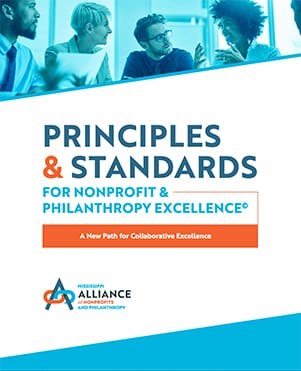Principles & Standards
For Nonprofit & Philanthropy Excellence
A New Path for Collaborative Excellence
The Principles & Standards for Nonprofit and Philanthropy Excellence are based on the fundamental values of quality, responsibility and accountability.
The 12 accountability principles distinguish the nonprofit and philanthropic sectors from government and the business sector. The management practices provide specific guidelines for individual organizations to evaluate and improve their operations, governance, human resources, advocacy, financial management and fundraising.
Principles & Standards for Nonprofit and Philanthropy Excellence are meant to educate nonprofit and philanthropic leaders, board members, managers, volunteers and staff about the fundamental roles and responsibilities of nonprofit and philanthropic organizations. The Alliance expects that the Principles and Standards will be useful to virtually every nonprofit and philanthropic organization as they form a set of reference tools that can be adapted to meet particular needs and circumstances.
Introduction & Framework
The Mississippi Alliance of Nonprofits and Philanthropy (the Alliance) is taking innovative and transformative approaches to support learning, growth, development, and collaboration between nonprofit and philanthropic organizations in Mississippi that are working to achieve better results for the state’s children, families, and communities. By providing tools and training for mission-based organizations to increase their capacity and effectiveness, The Alliance attracts investment to the state, supports the development of replicable and sustainable models, and promotes practical policy and programmatic solutions to some of the state’s most challenging and persistent issues. Alliance members are able to quickly move from conversation to collaboration to action through affinity groups, online communication tools, and other opportunities to connect, thereby enhancing and magnifying the impact of both philanthropy and nonprofits.
KEY TERMS & DEFINITIONS
501(c)(3) Designation by the Internal Revenue Service that recognizes nonprofit and philanthropic organizations as exempt from federal income taxes and eligible to receive tax-deductible contributions. Tax-exempt organizations must comply with specific federal regulations in order to retain their status. This 501(c)(3) designation allows contributors (individuals and corporate entities) to claim a tax deduction on donations of cash, goods and services to the exempt organization. A tax-exempt organization is not required to pay income tax except on income unrelated to the organization’s exempt purpose.
Advocacy Publicly supporting or recommending a particular cause or policy (not a candidate or political party) that impacts your constituents.
Board/Board of Directors The elected, governing body of a nonprofit organization. The board of directors of a nonprofit has... fiduciary responsibility for the mission, vision, monies and programs of
The 12 accountability principles
1 Civic Engagement, Advocacy, and Public Policy
2 Evaluation
3 Financial Management
4 Fundraising
5 Governance
6 Human Resources and Professional Development
7 Leadership and Organizational Culture
8 Legal Accountability & Transparency
9 Planning & Operations
10 Public/Private Foundation Standards
11 Strategic Directions & Alliances
12 Volunteer Management

